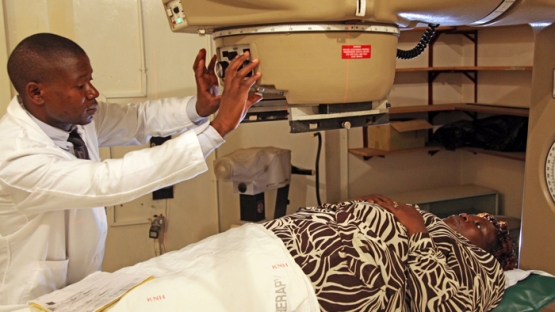Cancer is an emerging threat to public health throughout the African continent. Although infectious diseases continue to affect vulnerable populations, a notable increase in new cancer cases has been caused by factors related to economic development, including increased life expectancy, smoking, unhealthy diets, pollution, and physical inactivity. Yet, despite the growing burden which cancer represents, the disease continues to receive low public health priority in Africa. This is due in part to a lack of awareness regarding the current and future costs related to cancer among policymakers, national health agencies, and the general public.
In the hopes of raising due awareness for cancer, representatives of the IAEA attended the 8th Stop Cervical, Breast and Prostate Cancer in Africa Conference, held in Windhoek, Namibia from 20-22 July, 2014. The conference was organized to discuss cancers of the reproductive systems with the aim of contributing to the development of international strategies and partnerships to reduce their prevalence. By sharing experiences, identifying challenges, and raising awareness, participants hoped to fulfil the theme of this year's conference: "End Cervical Cancer by 2030: Universal Access to Cervical Cancer Prevention."
The event was organized by the Forum of African First Ladies Against Breast & Cervical Cancer, 11 of whom were in attendance to show their support for increased access to cancer treatment. The IAEA Deputy Director General (DDG) and Head of the Department of Technical Cooperation, Mr Kwaku Aning, participated in the event, and delivered a speech to the plenary session. Mr Aning was joined by Ms Nelly Enwerem-Bromson, Director of the IAEA Programme of Action for Cancer Therapy (PACT), who represented the IAEA in bilateral meetings, held concurrently with the conference.
Deconstructing the myth that cancer predominantly affects wealthy countries, Mr Aning said, "Cancer knows no border. It affects men, women and children, rich or poor, young or old everywhere." Indeed, 85% of women who die from cervical cancer-the focus of this year's event-live in developing countries.
Deputy Director General Aning went on to dispel another prevalent myth surrounding the disease: "Once cancer is diagnosed, it must be a death sentence… In reality, many cancers respond well to treatment and can even be cured." Even in low-resource settings, the early detection and treatment of cervical cancer is entirely feasible, as it doesn't necessarily require sophisticated facilities or specialized staff.
Unfortunately, capacities to detect, diagnose, and effectively treat cancers in Africa have been traditionally weak, as public health authorities focus on managing and suppressing infectious diseases. In studies conducted by the IAEA, it was demonstrated that two countries alone, Egypt and South Africa, account for 60% of the continent's radiotherapy resources. Worse still, approximately 20% of Africans, or nearly 200 million people, have no access to radiotherapy services.
However, with the support of its Member States and regional partners, the IAEA has contributed to progress recently made in this area. The IAEA is currently supporting over 130 projects in cancer diagnosis and treatment, and through these projects is delivering material and expert assistance amounting to more than US$260 million.
Under the auspices of both national and regional technical cooperation (TC) projects, nearly 25 African Member States have received comprehensive cancer control capacity and needs assessments, and 20 countries have established or strengthened their radiotherapy capacities. Moreover, the African region is now home to 20 population-based cancer registries, facilitating the informed decision-making for comprehensive cancer care at the national level.
This optimism was reflected in the words of Dr Margaret Chan, Director-General of the World Health Organization, who delivered the opening remarks at the SCCA Conference: "By pushing forward on the cervical cancer agenda, you give Africa hope that other cancers can be prevented or detected early and effectively treated."
The IAEA has also reached out to international stakeholders with the aim of mobilizing their diverse resources to fight cancer. The IAEA will continue to work with public and private sector partners including the World Health Organization, the Union for International Cancer Control (UICC), the International Agency for Research on Cancer (IARC), and the United States National Cancer Institute.
The first step to addressing the cancer challenge is to recognize its scale and instil a sense of global urgency. Despite the growing incidence of cancer in Africa, the disease and its victims still lack the appropriate attention and care necessary to confront the challenge. Deputy Director General Aning is hopeful that, by shining a light on the growing cancer epidemic, "we can fight for hope for cancer patients in Africa."


